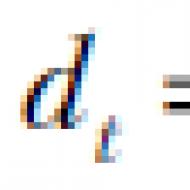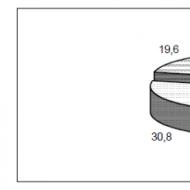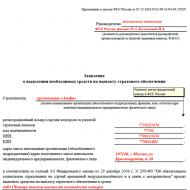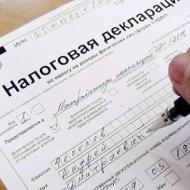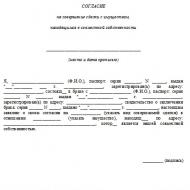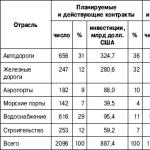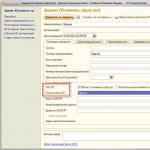
What is a desk tax audit? About desk tax audit. How to challenge the result of a desk audit
It is the main form of tax control and is carried out at the location of the tax authority.
The purpose of a desk tax audit is to monitor compliance by a taxpayer, fee payer or tax agent with legislation on taxes and fees.
Deadline for conducting a desk tax audit
Desk tax audit begins after submission to the tax office tax return or calculation.
To start an audit, no special decision of the head of the tax authority is required.
A desk tax audit is carried out within three months from the date the taxpayer submits a tax return (calculation).
Subject of desk tax audit
A desk tax audit is carried out on the basis of tax returns (calculations) and documents submitted by the taxpayer, as well as other documents on the activities of the taxpayer available to the tax authority.
Other documents include:
previously submitted tax returns (calculations);
documents received by the tax authority with the initial tax return (calculation) during a desk tax audit of the updated tax return (calculation);
documents previously received (drawn up) during on-site and desk tax audits and other tax control activities;
documents received by the tax authority when performing other functions legally within its competence tax authorities(By exchange control, checks of cash register equipment, completeness of revenue accounting, and so on);
decisions (resolutions) of tax authorities;
statements and messages received from the taxpayer and third parties;
materials received from law enforcement and other authorities, from off-budget funds, including in accordance with departmental agreements with the Federal Tax Service of Russia, regional departmental agreements, and so on;
other documents and information obtained legally, including those specified in the methodological documents of the Federal Tax Service of Russia on conducting a pre-audit analysis of the taxpayer.
What documents and explanations does the Federal Tax Service have the right to require during a desk tax audit?
During a desk audit of a declaration, the Federal Tax Service has the right to require the organization to submit additional documents or explanations in the following situations:
|
Situation |
What the Federal Tax Service has the right to demand |
|
Errors found in the declaration |
Explanations or corrected (clarified) declaration. |
|
It was revealed that the information contained in the declaration contradicts the information from the submitted documents |
|
|
It was revealed that the information contained in the declaration does not correspond to the information from the documents available to the Federal Tax Service |
Documents confirming the accuracy of the information in the declaration. |
|
Loss-making declaration submitted |
Explanations justifying the amount of loss. |
|
An updated declaration has been submitted in which the amount of tax payable is less than in the previously submitted declaration for the same period |
Explanations justifying the reduction in the tax amount. |
|
After two years from last day deadline for filing the declaration, an updated declaration is submitted in which, compared to the previously submitted declaration, the loss is increased or the amount of tax calculated for payment is reduced. |
Any documents confirming the validity of reducing the amount of tax payable or increasing the loss, including: registers tax accounting |
|
Mandatory supporting documents are not attached to the declaration |
Documents that must be attached to the declaration. For example, documents confirming the zero VAT rate. |
|
Documents confirming your right to these benefits. For example, documents confirming the sale of services exempt from VAT |
|
|
The VAT return states the amount of tax to be refunded |
Documents confirming the legality of VAT deductions. For example, supplier invoices, primary documents for the purchase of goods (works, services) |
|
The VAT return contains information about transactions that:
|
Explanations and any documents (including invoices and source documents) related to transactions in the information about which contradictions or inconsistencies have been identified. |
|
A declaration on mineral extraction tax, water or land taxes |
Documents that serve as the basis for the calculation and payment of these taxes. |
Procedure for conducting a desk tax audit
If errors and (or) contradictions are identified between the information contained in the submitted documents, or inconsistencies are identified between the information provided by the taxpayer, the information contained in the documents available to the tax authority, and received by it during tax control, the taxpayer is informed about this with a request provide the necessary clarifications within five days or make appropriate corrections within the prescribed period.
Desk tax audit: details for an accountant
- Tax control goes beyond
Requesting documents as part of a desk tax audit The most popular requests from tax authorities for information are requests based on the results of a desk tax audit. A desk tax audit is carried out on the basis of the submitted... It is important to note that when conducting a desk tax audit, the inspector considers in the declaration the correctness of... what tax control activity (on-site, desk tax audit of the counterparty) is being audited; signs...
- Another improvement in tax administration
2019: in the event of a desk tax audit, the deadlines established in paragraph. 2 p... 84 of the Tax Code of the Russian Federation). Tax control Desk tax audit of personal income tax Changes made to... the audit is terminated and a new desk tax audit begins based on the submitted tax return... . 230 Tax Code of the Russian Federation; Now a desk tax audit can be carried out without submitting... a sale or donation real estate. A desk tax audit will be carried out based on available...
- Desk audit of income tax return
What are the features of conducting a desk tax audit (hereinafter referred to as the CNI) on tax based on... this material. What are the features of conducting a desk tax audit (hereinafter referred to as the CIT) on...
- Taxpayer’s objections to the tax audit report: general rules for drawing up
Types (Article 87 of the Tax Code of the Russian Federation): desk tax audits; on-site tax audits. From the... tax audit. Based on the results of a desk tax audit, an act is not always drawn up, but... types (Article 87 of the Tax Code of the Russian Federation): desk tax audits; on-site tax audits. From the... tax audit. Based on the results of a desk tax audit, a report is not always drawn up, but...
- Primary documents for a desk audit of a VAT return
88 of the Tax Code of the Russian Federation, when conducting a desk tax audit, the tax authority does not have the right to demand.... 88 of the Tax Code of the Russian Federation, when conducting a desk tax audit, the tax authority has the right to request...
- Review of the main changes to the Tax Code of the Russian Federation, which were introduced by Law No. 325-FZ
...), establishing that in the event of a desk tax audit, the deadlines indicated in paragraph. 2 ... days following the day of completion of the desk tax audit for the corresponding tax (reporting) period... and fees during the desk tax audit, the time limits provided for in paragraph. 2 p..., conducting an on-site tax audit or a desk tax audit based on a VAT return...
- New approaches to tax control activities
For a comprehensive review of the materials of an on-site or desk tax audit, it is proposed to clarify the procedure for reviewing materials... a decision to extend the deadline for conducting a desk tax audit. The deadline for a desk tax audit can be extended until... a VAT return (with the exception of a desk tax audit of a VAT return submitted by a foreign... .2018. Of course, shortening the deadline for a desk tax audit of a VAT return will allow bona fide...
The day following the day of completion of the desk tax audit for the corresponding tax (reporting) period...
...% more than in 2017. Coverage of desk tax audits of organizations and individual entrepreneurs... out of 100 are involved in desk tax audits. The analysis shows that... their passage. The amount of additional assessments for desk tax audits is also being reduced, and by 2018... to 600 rubles. with 1 desk tax audit on average. Rice. 10. ... the amount of additional assessments based on the results of one desk tax audit is due, first of all, to the increase in the number ...
2.1. The purpose of a desk tax audit is to monitor compliance by taxpayers, fee payers, and tax agents with legislation on taxes and fees.
ConsultantPlus: note.
Federal Law dated June 8, 2015 N 150-FZ, paragraph one of paragraph 1 of Article 88 is supplemented by a sentence according to which a special declaration submitted in accordance with Federal Law dated June 8, 2015 N 140-FZ cannot be the basis for conducting a desk tax audit.
2.2. In accordance with paragraph 1 of Article 88 of the Code, a desk tax audit is carried out on the basis of tax returns (calculations) and documents submitted by the taxpayer, fee payer, tax agent (hereinafter referred to as the taxpayer), as well as other documents on the activities of the taxpayer available to the tax authority.
ConsultantPlus: note.
There was apparently a typo in the official text of the document: what is meant is the second paragraph of paragraph 1 of Article 88, and not paragraph 1.1 of Article 88.
In accordance with paragraph 1.1 of Article 88 of the Code, a desk tax audit of the calculation financial result investment partnership is carried out by the tax authority at the place of registration of the participant in the investment partnership agreement - the managing partner responsible for maintaining tax records.
A desk tax audit is carried out by authorized officials of the tax authority in accordance with their official duties without any special decision of the head of the tax authority within three months from the date the taxpayer submits a tax return (calculation) (clause 2 of Article 88 of the Code). When applying this norm regarding the interpretation of the concept of “representation” to the tax authorities, it is necessary to take into account that the three-month period provided for in paragraph 2 of Article 88 of the Code is intended for carrying out tax control activities as part of a desk tax audit and, based on the specified purpose of its establishment, can be calculated only from the date of receipt of the tax return (calculation) by the tax authority. The above does not change the rule of paragraph 8 of Article 6.1 of the Code, according to which the taxpayer is recognized as having fulfilled the obligation to submit a declaration if the document is submitted to the communications organization before 24 hours of the last day of the deadline. The specified period is calculated in this order, including in the following cases:
1) submitting a tax return (calculation) in any way: in person, by mail, electronically via telecommunication channels;
2) when documents are not submitted that, in accordance with the provisions of the Code, must be attached to the tax return (calculation).
The audit report indicates the date of receipt of the tax return (calculation) by the tax authority as the start date of the desk tax audit.
2.3. In accordance with paragraph 1 of Article 88 of the Code, when conducting desk tax audits, in addition to the documents submitted by the taxpayer with the tax return (calculation), other documents available to the tax authority are also used. These include:
previously submitted tax returns (calculations);
documents received by the tax authority with the initial tax return (calculation) - during a desk tax audit of the updated tax return (calculation);
documents previously received (drawn up) during on-site and desk tax audits and other tax control activities;
documents received by the tax authority when carrying out other functions legally within the competence of the tax authorities (currency control, checks of cash register equipment, completeness of revenue accounting, etc.);
decisions (resolutions) of tax authorities;
statements and messages received from the taxpayer and third parties;
materials received from law enforcement and other authorities, from extra-budgetary funds, including in accordance with departmental agreements with the Federal Tax Service of Russia, regional departmental agreements, etc.;
other documents and information obtained legally, including those specified in the methodological documents of the Federal Tax Service of Russia on conducting a pre-audit analysis of the taxpayer.
2.4. Desk tax audits are carried out in the following order:
1) acceptance and entry into automated information system tax authorities (hereinafter - AIS "Tax") data of all tax returns (calculations) submitted on paper and in in electronic format via telecommunication channels in accordance with the order of the Federal Tax Service of Russia dated July 18, 2012 N ММВ-7-1/505@.
Automated arithmetic control at the stage of entering indicators into the AIS "Tax" is carried out in relation to all submitted tax returns (calculations).
Automated arithmetic control is carried out using intra-document control relations.
Error protocols for interrelating tax return indicators are generated daily and, if necessary, printed. The specified protocols are generated in an automated mode when entering reports into the AIS "Tax", stored in the database and used in the work of the desk audit department;
2) automated desk control carried out by the desk audit department in relation to all submitted tax returns (calculations).
Automated desk control is carried out using intra-document and inter-document control relationships.
Employees of the desk audit department daily create error protocols for interrelating tax return indicators, financial statements, other documents and information received by the tax authorities, and, if necessary, print them out. These protocols are generated automatically in the AIS "Tax", stored in the database and used when conducting inspections.
3) further inspection with tax control measures is carried out by the desk audit department.
4) registration of the results of the audit with a tax audit report in accordance with Article 100 of the Code (if violations are identified), as well as other documents in accordance with the chapters of part two of the Code, regulating the calculation and payment of certain taxes.
2.4.1. When conducting a desk tax audit, information resources at the local, regional and federal levels are filled out in accordance with the procedures for their maintenance.
2.5. When conducting a desk tax audit, local information resources are used, and if available remote access regional and federal levels:
Directory credit institutions
Single State Register taxpayers (USRN)
Unified State Register legal entities(Unified State Register of Legal Entities)
Unified State Register of Individual Entrepreneurs (USRIP)
Restrictions
Transport (Reception, accounting, distribution and communication to tax authorities of information about vehicles and their owners)
Information on licenses and activities in the field of subsoil use (Nedra)
Bank-Exchange
Information from the Bank of Russia
FSS
Interaction with the Federal Migration Service of Russia (employers and foreign individuals)
Declarations on alcohol (Database of declarations on the volume of production and turnover of ethyl alcohol, alcoholic products)
Customs F
Information about persons who refused to participate in the organization in court
Directory " Individuals, in respect of which there are court decisions that have entered into force imposing an administrative penalty in the form of disqualification or court verdicts imposing a penalty in the form of deprivation of the right to engage in entrepreneurial activities" and the Register of Disqualified Persons (SLPFL and RDL)
State register of cash registers
Accounting for tax evasion schemes
Directory of codes of foreign organizations
Settlements with the local budget (hereinafter referred to as the "RSB" card)
Statement of accepted and entered tax returns (VND)
Average number of employees
Information on maximum retail prices for tobacco products
Journal of registration of provided property tax deductions
Information about individuals
Journal of registration of messages about the use (in whole or in part) of a property tax deduction by a taxpayer
Licenses
Interaction with the Federal Migration Service of Russia (Russian passport)
Magazine forced collection arrears, diagnosis and analysis (Diana)
Automated system control over the work of tax authorities to ensure bankruptcy procedures (OPB Control)
Journal of credits and returns
Journal of bankruptcy procedures (Journal OPB)
Execution - Stuck payments (information about Money ah, written off from taxpayers’ current accounts by banks, but not credited to accounts for accounting budget revenues)
Rosfinnadzor
Participants in electronic document flow of invoices
Processing of paper documents (invoices, purchase/sale books, bank statements) (ODBN)
VAT
Customs Union- exchange (information about paid indirect taxes when exporting and importing goods, performing work, providing services in the Customs Union)
Request for documents
Interrogations and examinations
Pension Fund
Bank monitoring
Monitoring externally economic activity
Debt inventory
Customs Union (EurAsEC)
Accounting for consolidated groups of taxpayers
Exchange with Sberbank of Russia
PC VAI
Monitoring of strategic enterprises ("Strategists")
Monitoring of financial and economic activities of organizations
Formation of IR "Transfer price"
SOI Analysis
Suspension of account transactions
Ephemera
Risks
Pre-audit analysis of taxpayers
Enterprise/industry monitoring
International information exchange
Journal of forced collection of arrears
other information resources of tax authorities,
as well as information resources of third parties (for example, SPARK - “System for Professional Analysis of Markets and Companies”, Information and Analytical System FIRA.PRO, search system for Russian enterprises "Kommersant KARTOTEKA", etc.).
2.6. Main directions of inspection.
During a desk tax audit, the tax official conducting the audit carries out:
a) checking the comparability of the indicators of the tax declaration (calculation) with the indicators of the tax declaration (calculation) of the previous reporting (tax) period;
b) interrelation of the indicators of the audited tax return (calculation) with the indicators of tax declarations (calculations) for other types of taxes and financial statements;
c) checking the reliability of the tax return (calculation) indicators based on an analysis of all information available to the tax authority.
Tax official:
checks the correctness of the reflection in the taxpayer’s RSB card of accruals on the submitted tax returns (calculations);
analyzes the protocol of disagreements based on the results of arithmetic control and the protocol of verification according to control ratios generated when entering data from tax returns (calculations) into the AIS "Tax" by the relevant department;
carries out control using QBE queries and analytical samples in order to compare indicators of tax returns (calculations) and financial statements and other data contained in the information resources of the tax authority, as well as information external sources, correctness of calculation tax base, checking the validity of the application of tax benefits, tax rates, as well as for the purpose of checking the completeness of the submission of tax returns (calculations), etc.;
forms and summarizes protocols for comparing indicators of tax returns (calculations) and financial statements and other data contained in the information resources of the tax authority, as well as information from external sources;
for the purpose of carrying out control and analytical work, incl. on the selection of taxpayers for on-site tax audits, conducting internal audit(complex audits, remote monitoring, remote checks), etc., the generated protocols are saved electronically, in the form of Excel tables. In the resulting tables, you can enter information about tax control activities carried out in connection with identified discrepancies (inconsistencies), details of the taxpayer’s response to a message from the tax authority, reasons for justified discrepancies and other information about the results of tax control;
additionally checks line-by-line control of tax declaration data, if necessary, compares the indicators of the current declaration with previously submitted ones, and carries out the necessary tax control measures;
whenever possible, compares the indicators of declarations (calculations) and financial statements with indicators for similar taxpayers and with industry average indicators (possibly for previous periods); in the case of a significant deviation, establishes the reason for the discrepancies.
When conducting a desk tax audit of tax returns submitted by major taxpayers, a tax authority official carries out the following activities:
analyzes revenue indicators, profitability, tax burden;
conducts comparative analysis revenue indicators, profitability, tax burden; the analyzed taxpayer with average indicators for the type of economic activity and indicators for similar taxpayers, reveals high tax risks;
analyzes the reasons for reducing the tax burden;
carries out work to identify “problem” counterparties;
monitors the taxpayer’s tax base in comparison with previous periods;
conducts an analysis of transactions that affected the reduction of the tax base, etc.
In order to verify the reliability of the indicators of the submitted tax returns (calculations), it is mandatory to use data both available to the tax authority and obtained during other tax control activities, incl. requested during tax control activities, both by the tax authority itself and on instructions from other tax authorities (Code).
As part of desk audits of tax returns, in order to confirm the reality of financial and economic activities, it is necessary to use the information contained in the information resources of the tax authorities.
Based on the results of the automated control, comparison of data, information from external sources, documents submitted by the taxpayer along with the tax return (calculation), data from information resources, etc. the inspector must decide on the need to carry out other tax control measures.
If there is no need to carry out other tax control measures, the desk tax audit ends, and the end date of the set of measures is entered into the AIS "Tax". Documents received during tax control activities are transferred for storage to the appropriate department. The completeness and accuracy of filling out the information resource for desk audits in the AIS "Tax" is checked.
2.7. If a desk tax audit reveals errors in the tax return (calculation) and (or) contradictions between the information contained in the submitted documents, or reveals inconsistencies between the information provided by the taxpayer, the information contained in the documents available to the tax authority, and received by it during the tax control, tax authority officials conducting a desk tax audit carry out the mandatory procedure provided for in paragraph 3 of Article 88 of the Code by sending a request to the taxpayer to provide explanations or make changes. In any case, this procedure is mandatory before drawing up an inspection report.
Carrying out tax control activities through the optimal use of labor and time resources of tax authorities to achieve the greatest efficiency in tax control. The procedure provided for in paragraph 3 of Article 88 of the Code is not carried out in cases where errors, contradictions and inconsistencies do not clearly indicate signs of tax offenses.
(see text in the previous edition)
(see text in the previous edition)
Documentation of the fact that the tax authority has detected an offense. To exclude cases of unjustified exemption from tax liability (subject to formal compliance with the requirements of Article 81 of the Code) on the basis of the information contained in the said requirement, provided that the inconsistencies (errors, contradictions) indicate signs of a tax offense, it is recommended when preparing the requirement to clearly indicate This.
(see text in the previous edition)
Summons on the basis of subparagraph 4 of paragraph 1 of Article 31 of the Code. If it is necessary to summon the taxpayer to the tax authority to give explanations, the tax authorities use the Notice of Summoning of the Taxpayer (Fee Payer, Tax Agent). The form of the Notification of calling a taxpayer (fee payer, tax agent) was approved by order of the Federal Tax Service of Russia dated 05/08/2015 N ММВ-7-2/189@.
(see text in the previous edition)
To confirm the accuracy of the data reflected in the tax return (calculation), the taxpayer, along with explanations, has the right to additionally submit to the tax authority extracts from the tax and (or) registers. accounting and (or) other documents confirming the accuracy of the data reflected in the tax return (calculation).
If, after the person conducting the desk tax audit has reviewed the explanations and documents provided, or in the absence of explanations from the taxpayer, the tax authority establishes the fact of a tax offense or other violation of the legislation on taxes and fees, tax authority officials are required to draw up an inspection report in the manner prescribed by Article 100 of the Code .
If a desk tax audit reveals errors, inconsistencies between information about transactions contained in the tax return for value added tax or inconsistencies between information about transactions contained in the tax return for value added tax submitted by the taxpayer and information about specified operations contained in the tax return for value added tax submitted to the tax authority by another taxpayer, or in the log of received and issued invoices submitted to the tax authority by a person who, in accordance with Chapter 21 of this Code, is assigned the corresponding duty, in the event , if such contradictions and inconsistencies indicate an underestimation of the amount of value added tax payable in budget system Russian Federation, or about an overstatement of the amount of value added tax declared for reimbursement, the tax authority, when sending a request for explanations in accordance with paragraph 3 of Article 88 of the Code, uses the application forms in accordance with Appendices 2.1 - 2.9 to these recommendations.
(see text in the previous edition)
In order to simplify the procedure for processing a request for explanations sent by the tax authority in electronic form through an electronic document management operator via telecommunication channels, an application file in electronic form is additionally generated as part of the specified document in accordance with the format given in Appendix 2.10 to these recommendations.
(see text in the previous edition)
(see text in the previous edition)
Explanations in response to the request for explanations are sent by the taxpayer via telecommunication channels through an electronic document management operator in accordance with the format, approved by order Federal Tax Service of Russia dated December 16, 2016 N ММВ-7-15/682@, using the document format required to ensure electronic document management with the tax authority, approved by order of the Federal Tax Service of Russia dated January 18, 2017 N ММВ-7-6/16@.
(see text in the previous edition)
2.8. Tax control activities may be carried out after the mandatory procedure provided for in paragraph 3 of Article 88 of the Code. When conducting desk tax audits, the following tax control activities may be carried out:
1) sending requests to the competent authorities of foreign states, carried out in accordance with methodological instructions on the procedure for exchanging information upon request with the competent authorities of foreign states approved by the Federal Tax Service of Russia.
The exchange of information is carried out with the competent authorities of those foreign states with which there are valid international treaties.
Requests are sent to the competent authorities of foreign states if the following grounds exist:
a) information on the registration of a foreign partner of the taxpayer under audit is not confirmed by information obtained from open databases on the registration of subjects of law of foreign states (only in relation to states that have open databases);
b) there is information indicating that the taxpayer is using a tax evasion scheme, i.e. the transaction contains signs that the taxpayer being inspected has committed a violation of the legislation on taxes and fees.
Requests to the competent authorities of foreign states are sent if the tax authority needs to obtain information about the taxpayer’s activities related to persons located in foreign states.
Requests to the competent authorities of foreign states are sent in cases where all internal possibilities have been exhausted or obtaining information within the Russian Federation is not possible.
Under internal capabilities for the purposes of this letter, all tax control activities provided for by the Code are understood (requesting documents, interrogating witnesses, obtaining explanations from the taxpayer, sending requests to executive authorities in accordance with concluded agreements or joint orders, etc.) in order to obtain the necessary information, etc. .;
2) the tax authority sends requests to the bank about the availability of accounts, deposits (deposits) in the bank and (or) about cash balances in accounts, deposits (deposits), about the provision of statements of transactions on accounts, on deposits, certificates of balances of electronic funds and transfers of electronic funds of organizations (individual entrepreneurs, individuals who are not individual entrepreneurs, notaries engaged in private practice, lawyers who have established law offices).
The procedure for tax authorities to send requests to the bank on paper was approved by Order of the Federal Tax Service of Russia dated July 25, 2012 N ММВ-7-2/518@. The procedure for sending requests by tax authorities to the bank electronically was approved by order of the Federal Tax Service of Russia dated July 25, 2012 N ММВ-7-2/520@.
Failure by the bank to provide certificates on the availability of bank accounts and (or) on cash balances in the accounts, statements of transactions on the accounts to the tax authority in accordance with paragraph 2 of Article 86 of the Code, as well as the submission of certificates (statements) in violation of the deadline or certificates (statements ), containing false information, entails tax liability of the bank provided for in Article 135.1 of the Code.
Failure by the bank to submit certificates on electronic money balances and on electronic money transfers to the tax authority in accordance with paragraph 2 of Article 86 of the Code, as well as the submission of certificates in violation of the established deadline or certificates containing false information, entails tax liability of the bank provided for in paragraph 6 of the article. 135.2 of the Code.
Failure to submit within the time limit established by the legislation on taxes and fees or refusal to submit to the tax authority documents and (or) other information necessary for the implementation of tax control, drawn up in the prescribed manner, as well as the submission of such information incompletely or in a distorted form shall entail administrative liability of officials persons of the bank, provided for in Part 1 of Article 15.6 of the Code of Administrative Offenses of the Russian Federation;
Any individual who may be aware of any circumstances relevant to the implementation of tax control may be called as a witness to testify. The witness's testimony is recorded in the protocol. The form of the Protocol of Interrogation of a Witness is given in Appendix No. 3 to the order of the Federal Tax Service of Russia dated May 31, 2007 No. MM-3-06/338@.
The following cannot be questioned as a witness:
a) persons who, due to their young age, physical or mental disabilities, are not able to correctly perceive circumstances that are important for the implementation of tax control;
b) persons who received information necessary to conduct tax control in connection with the performance of their professional duties, and such information relates to the professional secret of these persons, in particular a lawyer, an auditor.
An individual has the right to refuse to testify only on the grounds provided for by the legislation of the Russian Federation.
The testimony of a witness may be obtained at his place of residence if, due to illness, old age, or disability, he is unable to appear before the tax authority, but at his discretion official tax authority - and in other cases.
Before receiving testimony, the tax authority official warns the witness about liability for refusal or evasion to testify, or for giving knowingly false testimony, about which a note is made in the protocol, which is certified by the signature of the witness.
Failure to appear or evasion of appearance without good reason by a person called in a tax offense case as a witness entails tax liability of the witness provided for in part one of Article 128 of the Code.
The unlawful refusal of a witness to testify, as well as the giving of knowingly false testimony, entails tax liability of the witness provided for in part two of Article 128 of the Code;
Until 01/01/2015:
4) inspection of documents and items received by an official of the tax authority as a result of previously taken actions to implement tax control or with the consent of the owner of these items to conduct their inspection, including at their location in production, warehouse, retail and other premises and on territory of the person being inspected, carried out in accordance with Article 92 of the Code.
From 01/01/2015:
inspection of the territories, premises of the person in respect of whom a tax audit is being carried out, documents and items during a desk tax audit on the basis of a tax return for value added tax, in the cases provided for in paragraphs 8 and 8.1 of Article 88 of the Code, in order to clarify the circumstances having value for the completeness of the verification (clause 1 of Article 92 of the Code). Inspection of documents and items in cases not provided for in paragraph 1 of Article 92 of the Code, including within the framework of a desk tax audit, is permitted if the documents and items were received by an official of the tax authority as a result of previously taken actions to exercise tax control or with the consent of the owner of these items for inspection.
The inspection is carried out in the presence of witnesses.
The person subject to the tax audit, or his representative, as well as specialists, have the right to participate during the inspection.
IN necessary cases During the inspection, photography, filming, video recording are taken, copies of documents are taken, or other actions are taken.
A protocol on the inspection is drawn up. The form of the Protocol for the inspection of territories, premises, documents, objects is given in Appendix No. 4 to the order of the Federal Tax Service of Russia dated May 31, 2007 No. MM-3-06/338@;
5) an inventory of property owned by the taxpayer with the consent of the inspected person, including at its location in production, warehouse, trading and other premises and on the territory of the inspected person, carried out in accordance with the Regulations on the procedure for conducting an inventory of taxpayers’ property when tax audit, approved by order of the Ministry of Finance of Russia dated March 10, 1999 N 20n, Ministry of Taxes of Russia N GB-3-04/39.
Obstructing the access of tax authority officials conducting a tax audit on the territory or premises of the person being inspected for the purpose of taking an inventory of property within the framework of a desk tax audit does not entail liability for the taxpayer or his officials due to the fact that such access is carried out strictly on a voluntary basis with the consent of taxpayer.
The inventory is carried out in order to verify the accuracy of the data contained in the taxpayer’s documents, as well as to clarify other circumstances relevant to the performance of the tasks of the tax audit.
It is advisable to carry out an inventory in cases where the results of the inspection accounting documentation taxpayer, analysis of information obtained from other sources, and (or) inspection of the taxpayer’s territories and premises gave reason to assume the presence of inventory, fixed assets or other property not reflected in the taxpayer’s accounting records.
The inventory of the taxpayer’s property includes an inventory of fixed assets, intangible assets, financial investments, industrial stocks, finished products, goods, other inventories, cash, accounts payable and accounts receivable and other financial assets.
Based on the results of the inventory, inventory lists or acts are drawn up;
6) requesting documents from the person being inspected, carried out in accordance with Article 93 of the Code. The procedure for sending a request for the submission of documents (information) and the procedure for submitting documents (information) at the request of the tax authority in electronic form via telecommunication channels was approved by Order of the Federal Tax Service of Russia dated February 17, 2011 N ММВ-7-2/168@.
It must be taken into account that in accordance with paragraph 7 of Article 88 of the Code, when conducting a desk tax audit, the tax authority does not have the right to request additional information and documents from the taxpayer, with the exception of:
a) confirming the right to tax benefits for taxpayers using such benefits (clause 6 of Article 88 of the Code). Tax and fee benefits are the advantages provided by tax legislation individual categories taxpayers in comparison with others (clause 1 of Article 56 of the Code). TO tax benefits also includes the opportunity not to pay a particular tax or fee or to pay it in a smaller amount;
b) which, in accordance with the provisions of the Code, must be attached to the tax return (calculation), if they were not submitted together with the declaration or calculation (clause 7 of Article 88 of the Code). Submission of documents along with tax returns is provided for in subparagraphs 15, 19 of Article 149, Article 165, paragraph 13 of Article 167, paragraph 2 of Article 184, paragraphs 7, 7.1 of Article 198, paragraphs 11-19 of Article 201, paragraph 7 of Article 204, paragraph 18 of Article 214.1 , paragraphs 13, 13.1, 28 of Article 217, subparagraphs 3, 5 of paragraph 1 of Article 219, paragraph 1 of Article 220, paragraph 4 of Article 220.1, paragraph 4 of Article 220.2, paragraph 8 of Article 262, paragraph 6 of Article 284.1, paragraph 6 of Article 289, paragraph 2 of Article 386.1 of the Code);
c) confirming the legality of applying tax deductions when filing a tax return for value added tax, which declares the right to a tax refund (clause 8 of Article 88 of the Code);
From 01/01/2015:
d) invoices, primary and other documents related to the following transactions when discrepancies are identified between information about transactions contained in the tax return for value added tax, or when inconsistencies are identified about information about transactions contained in the tax return for value added tax , submitted by the taxpayer, information about the specified transactions contained in the tax return for value added tax submitted to the tax authority by another taxpayer (another person who, in accordance with Chapter 21 of the Code, is charged with the obligation to submit a tax return for value added tax), or in the log of received and issued invoices submitted to the tax authority by a person who, in accordance with Chapter 21 of the Code, is entrusted with the corresponding responsibility, if such contradictions and inconsistencies indicate an underestimation of the amount of value added tax payable to the budget , or an overstatement of the amount of value added tax declared for reimbursement, the tax authority also has the right to request from the taxpayer (clause 8.1 of Article 88 of the Code);
e) information about the period of participation of a participant in an investment partnership agreement in such an agreement, about his share of the profits (expenses, losses) of the investment partnership (during a desk tax audit of the tax return (calculation) for corporate income tax, personal income tax) (clause 8.2 of Article 88 of the Code - Until 01/01/2015, a similar rule was in clause 8.1 of Article 88 of the Code);
From 01/01/2014:
f) primary and other documents confirming changes in information in the relevant indicators of the tax return (calculation), and analytical tax accounting registers, on the basis of which these indicators were formed before and after their changes during a desk tax audit based on the updated tax return (calculation), submitted after two years, from the day established for filing a tax return (calculation) for the relevant tax for the corresponding reporting (tax) period, in which the amount of tax payable to the budget is reduced or the amount of the resulting loss is increased compared to the previously submitted tax declaration (calculation);
g) any documents that are the basis for the calculation and payment of taxes related to the use of natural resources(clause 9 of Article 88 of the Code);
In addition, on the basis of subparagraph 5 of paragraph 1 of Article 23 of the Code, the tax authority at the place of residence individual entrepreneur, a notary engaged in private practice, a lawyer who has established a law office, has the right to request a book of income and expenses and business transactions.
A tax official conducting a tax audit has the right to request from the person being audited the documents necessary for the audit. The requirement to submit documents may be submitted to the head (legal or authorized representative) of the organization or individual (his legal or authorized representative) in person against signature or transmitted electronically via telecommunication channels. The form of the Requirement for the submission of documents (information) is given in Appendix No. 5 to the order of the Federal Tax Service of Russia dated May 31, 2007 No. MM-3-06/338@. If the request for the submission of documents cannot be transmitted using the specified methods, it is sent by registered mail and is considered received after six days from the date of sending the registered letter.
The requested documents can be submitted to the tax authority in person or through a representative, sent by registered mail or transmitted electronically via telecommunication channels.
Submission of documents on paper is made in the form of copies certified by the person being verified. It is not permitted to require notarization of copies of documents submitted to the tax authority (official), unless otherwise provided by the legislation of the Russian Federation.
If the documents requested from the taxpayer are compiled in electronic form in accordance with the formats established by the Federal Tax Service of Russia, the taxpayer has the right to send them to the tax authority in electronic form via telecommunication channels.
The procedure for sending a request for the submission of documents (information) and the procedure for submitting documents (information) at the request of the tax authority in electronic form via telecommunication channels was approved by Order of the Federal Tax Service of Russia dated February 17, 2011 N ММВ-7-2/168@. The format of the document required to ensure electronic document flow with the tax authority in relations regulated by the legislation on taxes and fees was approved by Order of the Federal Tax Service of Russia dated January 18, 2017 N ММВ-7-6/16@.
(see text in the previous edition)
If necessary, the tax authority has the right to familiarize itself with the original documents.
Documents that were requested during a tax audit are submitted within 10 days (20 days for a tax audit of a consolidated group of taxpayers) from the date of receipt of the corresponding request.
If the inspected person is unable to submit the requested documents within the period established by this paragraph, he, within the day following the day of receipt of the request for the submission of documents, notifies in writing the inspecting officials of the tax authority of the impossibility of submitting documents within the specified time frame, indicating the reasons. for which the requested documents cannot be submitted to deadlines, and the time period within which the person being inspected can submit the requested documents.
Within two days from the date of receipt of such notification, the head (deputy head) of the tax authority has the right, on the basis of this notification, to extend the deadline for submitting documents or to refuse to extend the deadline, for which a separate decision is made.
When conducting a tax audit of a consolidated group of taxpayers, the deadlines are extended by at least 10 days.
The refusal of the person being inspected to submit the documents requested during a tax audit or failure to submit them within the established time frame is recognized tax offense and entail liability provided for in paragraph 1 of Article 126 of the Code.
In the event of such a refusal or failure to submit the specified documents within the established time frame, the tax official conducting the tax audit carries out a seizure necessary documents in the manner prescribed by Article 94 of the Code.
Failure to submit within the period established by the legislation on taxes and fees or refusal to submit to the tax authorities documents and (or) other information necessary for the implementation of tax control, drawn up in the prescribed manner, as well as the submission of such information incompletely or in a distorted form shall entail administrative liability of officials persons provided for in Part 1 of Article 15.6 of the Code of Administrative Offenses of the Russian Federation.
During a tax audit or other tax control activities, tax authorities do not have the right to request from the inspected entity (consolidated group of taxpayers) documents previously submitted to the tax authorities during desk or field tax audits of the inspected entity (consolidated group of taxpayers). This restriction does not apply to cases where documents were previously submitted to the tax authority in the form of originals, which were subsequently returned to the person being inspected, as well as to cases where documents submitted to the tax authority were lost due to force majeure;
7) requesting documents (information) from other (in relation to the taxpayer being audited) persons, carried out in accordance with Article 93.1 of the Code. It must be taken into account that in accordance with paragraphs 1, 1.1 of Article 93.1 of the Code, a tax official conducting a desk tax audit has the right to demand:
documents (information) relating to the activities of the taxpayer being inspected (fee payer, tax agent) from the counterparty or from other persons who have these documents (information), including information regarding a specific transaction from the participants in this transaction or from other persons who have information about this transaction;
information relating to the activities of the investment partnership for the audited period when conducting a desk tax audit of the calculation of the financial result of the investment partnership, tax return (calculation) for corporate income tax, personal income tax of the participant in the investment partnership agreement, from the participant in the investment partnership agreement - the managing partner, person responsible for tax accounting:
composition of participants in the investment partnership agreement, including information on changes in the composition of participants the said agreement;
the composition of the participants in the investment partnership agreement - managing partners, including information on changes in the composition of such participants in the said agreement;
share of profits (expenses, losses) attributable to each of the managing partners and associates;
the share of participation of each of the managing partners and partners in the profits of the investment partnership, established by the investment partnership agreement;
the share of each of the managing partners and partners in common property comrades;
changes in the procedure for determining by the participant in the investment partnership agreement - the managing partner responsible for maintaining tax accounting - expenses incurred in the interests of all partners for conducting the common affairs of the partners, if such a procedure is established by the investment partnership agreement.
If necessary, the tax authority has the right to familiarize itself with the original documents. When applying paragraph 2 of Article 93 of the Code, it must be taken into account that this refers to documents that were previously requested under Articles 93, 93.1 of the Code.
A notice of the need to ensure familiarization with documents related to the calculation and payment of taxes is given to the person in respect of whom the audit is being carried out (his representative).
Disobedience to a lawful order or requirement of an official of a body exercising state supervision (control), as well as obstruction of this official from carrying out official duties, entails the responsibility of citizens and officials provided for in Part 1 of Article 19.4 of the Code of Administrative Offenses of the Russian Federation.
The Federal Tax Service is an agency that, due to the specifics of its activities, often arranges regular inspections of the activities of enterprises. They are carried out due to the need to exercise tax control and monitor compliance with regulations by payers of the law. Among the most common types of procedures in question are desk audits. How often can they be held? What conclusions can the Federal Tax Service come to after conducting such inspections?
Desk audit: definition
Based on the wording of the Tax Code of the Russian Federation, a desk tax audit is a procedure carried out by the territorial body of the Federal Tax Service of Russia, aimed at studying the declarations and other documents of the payer operating at the location of the department structure.
The goal is to control compliance with the legislation regulating the calculation and payment of relevant fees to the treasury. A desk tax audit is carried out within 3 months from the moment the payer submits a declaration and accompanying documents to the Federal Tax Service.
Formalities
Based on the results of the procedure, documents may be drawn up indicating a violation of the relevant laws. As a rule, this is an act formed in a special form. If no problems are identified, such sources cannot be compiled. At the same time, if a desk tax audit reveals that an entrepreneur made errors in the declaration and other documents, then an order is issued to him: to make appropriate adjustments to the sources within 5 days. If the payer refused to consider the relevant request, then, in turn, the Federal Tax Service employee has the right to draw up the act described above.
Tax audit report
What might be the structure of the relevant document discussed above? What does a desk tax audit report look like? We will now look at a sample of this source regarding key wording.

According to standard form, on which reports of desk audits are drawn up, we will be most interested in paragraphs 2 and 3 of the corresponding document.
Paragraph 1 of the act, as a rule, indicates formal information - the organization’s address, name, type of inspection, etc.
In paragraph 2, the Federal Tax Service sets out a list of violations. This could be, for example, a wording like “it has been established that the declaration was signed by a person not related to the activities of the company.”
Paragraph 3, in turn, sets out the conclusions and recommendations (proposals) of the Federal Tax Service to eliminate violations. In our case, this will probably be wording like “to make corrections to the declaration.”
Differences from on-site inspection
It should be noted that in addition to the desk audit, there is also an on-site tax audit. What is the difference? An on-site tax audit implies that the Federal Tax Service will study not only the documents, but also the correctness of the calculation, as well as the payment of all necessary fees to the treasury. The basis for carrying out such a procedure is an order from the head of the territorial division of the Federal Tax Service, which operates at the place of registration of the payer. At the same time, an “on-site” inspection does not necessarily imply the actual arrival of tax officials at the entrepreneur’s office. Let us assume an option in which the corresponding procedure can be carried out in the offices of the Federal Tax Service. An on-site inspection may involve examining the activities of an entrepreneur for the calculation and payment of one or several types of taxes. The period of operation of the company in the previous 3 years is subject to study. At the same time, it is not allowed to check a company in an on-site format twice during the same period.

As we said above, a desk tax audit only allows for the drawing up of an act on violations of the procedure for calculating and paying taxes to the treasury. In the case of an on-site format, there may be more options for the actions of the Federal Tax Service. Tax authorities may require various examinations, request information from foreign structures and carry out other additional actions.
Desk inspection: procedure
Let's study the order in which a tax audit is carried out in a desk format. As we have already said, this procedure is mainly based on studying the correctness of filling out declarations and other documents. A desk audit is initiated the moment the Federal Tax Service receives the relevant reports from the entrepreneur. Federal Tax Service specialists check declarations and accompanying documents for:
- correctness of determining the tax base;
- the correctness of the arithmetic operations used in lines and columns;
- the legality of the claimed deductions;
- the correctness of the rates applied by the payer and possible benefits, based on the provisions of the relevant legislation;
In turn, within the framework of each of the listed stages of verification, the Federal Tax Service carries out a set of other actions (for example, reconciling the received figures with those indicated in declarations for previous periods, information in own databases data, etc.).

If a tax audit reveals errors or inconsistencies in the documents, then, as we said above, the entrepreneur is informed about them in writing. At the same time, the Federal Tax Service invites him to change or supplement the relevant sources. If both actions were not carried out by the tax authorities, then the result desk audit is declared invalid. Accordingly, if the payer has not made the necessary corrections to the documents, the Federal Tax Service will issue a corresponding violation. However, this is not the only possible scenario for further actions. Let's consider possible options activities of the department after the desk audit of tax returns and other documents is completed.
Tax authorities' actions
Actually, as soon as a Federal Tax Service employee discovers errors in the sources provided by the payer, he is obliged to draw up a report addressed to the management of his territorial department. It sets out facts that indicate a possible violation by a person tax legislation. There, in the memo, the Federal Tax Service employee reflects a recommendation to make a decision. Typically one of the following:
- hold the payer accountable (or refuse this procedure);
- initiate additional activities related to tax control.
Interesting fact: if the payer, having received recommendations from the Federal Tax Service on correcting incorrect information in declarations and other documents, has not taken the necessary actions, then the tax authorities have the right to initiate not a desk-type procedure, but an off-site one. This is a scheduled check. The tax office may include the enterprise in the appropriate list.
If taxes are underpaid
The Federal Tax Service can establish, by examining declarations and other related documents, that the entrepreneur unreasonably underestimated the amount of fees to be calculated and paid. That is, by carrying out not only on-site, but also desk audits of tax authorities, department employees have the right to establish such facts. In this case, within 10 days after the relevant procedure, the head of the territorial division of the Federal Tax Service issues an order to hold the payer accountable in accordance with the norms of the Tax Code of the Russian Federation. After this, the entrepreneur is notified of the need to pay the missing amount of fees, including penalties, to the budget, as well as make adjustments to the documents.
Document processing
Desk audit - what kind of procedure is this from the point of view of the algorithm of actions of tax authorities in terms of working with documents? Let's consider this nuance.

First of all, documents are examined for completeness and relevance of submission - in accordance with the deadlines established by law. Next, it checks how timely the documents were submitted to the Federal Tax Service. The next stage is the appearance of the documents, the presence of all necessary details, correct font, etc. Next, the correctness of calculations, arithmetic, and the validity of using benefits is examined. The next stage is checking the correctness of determining the tax base.
Thus, during a desk audit, a Federal Tax Service employee performs three types of main actions:
- checking for compliance with formal requirements regarding the completion of documents;
- study of the payer’s arithmetic operations for correctness;
- verification of documents and information in them from the point of view of regulatory regulation.
The procedure that completes the desk audit is drawing conclusions on all the numbers and other parameters of studying documents, forming instructions.
Deadlines
The most important aspect of such a procedure as a desk tax audit is the timing. Above, we only indicated that the maximum time interval that the Federal Tax Service has to complete the study of documents submitted by an enterprise is 3 months. Now we will look at the nuances associated with timing in more detail.

As such, the countdown of the allotted period of time for verification begins from the moment the entrepreneur’s documents are received by the Federal Tax Service. For example, if a desk tax audit on VAT is implied, then the submission of the corresponding quarterly declaration will be considered its beginning.
An important nuance regarding the deadlines is that they can be extended. But the Federal Tax Service must have substantial grounds for this. Which for example? As a rule, such cases are possible if the documents of the largest payers in the region are checked (according to the criteria established by the Federal Tax Service). It is also possible to increase the inspection period if department employees have identified inaccuracies or contradictions in the information provided by the company, which may indicate a direct violation of the law. Another possible reason is that the Federal Tax Service considered it necessary to carry out additional procedures within the framework of tax control.
Discussion points
We have studied the main characteristics of such a phenomenon as a desk audit and what it is. At the same time, it is worth noting a nuance regarding some problematic and, to some extent, controversial issues characteristic of this procedure. Many lawyers believe that there are unresolved legal and organizational problems in this area. They can be observed during law enforcement practice, arbitration activities.

One of the most pressing problems is related to the VAT refund procedure. The fact is that enterprises that overpaid for one reason or another this tax, formally have the right to return surpluses from the budget. However, in practice, it can be difficult for businesses to carry out this procedure - mainly because the Federal Tax Service authorities, according to some experts, sometimes get too involved in requesting additional documents from enterprises during desk audits of VAT returns. This significantly slows down the process and can negatively affect the dynamics of interaction between the enterprise and partners and contractors. The difficulty here is also that the Tax Code of the Russian Federation does not yet have a list of documents that can clearly indicate the right of a business to receive a VAT deduction. And therefore, tax authorities, as experts note, sometimes require too wide a range of sources.
Another group of problems is connected, in fact, with what some lawyers believe are not entirely unambiguous formulations in the Tax Code of the Russian Federation. A simple example - in paragraph 3 of Article 88 of the Code it is stated that if errors in the declaration are identified during a desk audit, the taxpayer is informed about this. However, as lawyers note, it is not directly stated here whether this is the responsibility of the Federal Tax Service or whether it is a right. At the same time, this kind of action of the Federal Tax Service, such as issuing a demand to the payer to eliminate violations, is classified precisely as a right, based on the wording of paragraph 1 of Article 31 of the Tax Code of the Russian Federation. In turn, arbitration practice contains precedents that indicate that the corresponding action of the Federal Tax Service should still be considered as an obligation.
The next group of problems is related to the insufficient elaboration of the criteria by which on-site inspections, based on office results. That is, it is possible that a business clearly carried out work with violations, but a more stringent control procedure was not initiated against it: all that the Federal Tax Service sent was an act of a desk tax audit, which, in fact, may not in any way affect the further behavior of the business in terms of intentional violations of relevant legislation. In turn, it happens that the company made virtually random errors in filling out documents, but the Federal Tax Service still decided to carry out an on-site event.
Experts believe that there should still be a fair relationship between the two tax control procedures. The criteria in this case may be:
- the degree of compliance of indicators in tax and accounting documents;
- logic between settlement procedures for different parts of the business;
- comparison of data for different periods;
- comparison of information obtained during a desk audit and information received by the Federal Tax Service from other sources.
Experts name improvement of the technological base as possible tools that would allow the Federal Tax Service to do its work more efficiently. That is, if, for example, there are some inconsistencies in a particular business, and they are obvious - computer program in accordance with the established algorithms, visually and using objective indicators, will be able to identify possible violations that may be the basis for an on-site inspection.
We have already spoken about the timing of the desk audit. You can get acquainted
In this article we will answer the question: what is a desk audit? And we’ll tell you about the procedure for holding a camera room.
So, what is a desk audit? And what is it?
A desk audit is a mandatory quarterly tax audit.
The desk check consists of:
- arithmetic verification of calculations in declarations (to identify mathematical errors)
- comparison of indicators with declarations for past periods
- comparison of indicators in the same period for different taxes
- comparison of indicators with financial statements
First, the desk check takes place automatically.
All data from declarations and reporting of an organization (or entrepreneur) is entered into a database, where indicators are reconciled automatically.
Without exception, all declarations and calculations submitted by organizations and entrepreneurs to the tax office undergo a desk tax audit. Tax agents not an exception.
If the Federal Tax Service program does not find errors, i.e. all the necessary reporting has been submitted, the arithmetic calculations are correct, the data in different declarations do not contradict each other, then the desk tax audit is considered successfully completed.
In order for employees tax service If you have any unnecessary questions, we advise you when forming tax reporting in the accounting program, use the option to check control ratios.
If errors are found...
In this case, employees tax office They may call you to the inspectorate to give explanations.
This can happen in the following cases:
- if, when checking the declaration, errors or inconsistencies with the data available to the tax inspectorate are discovered
- if a corrective (updated) declaration is filed, in which the tax amount is reduced relative to the initial declaration
- if the declaration states tax to be reimbursed from the budget
In these cases, a request for clarification is sent. The request can be sent in one of the following ways:
- personally
- Russian Post
- in electronic form, if you submit reports electronically.
If the request is received by you electronically, within 6 days you are required to send a receipt to the tax office. Otherwise, after 10 days you risk being left with a blocked current account.
What needs to be done for the desk audit to be successfully completed.
So, if you nevertheless receive a request to provide explanations in connection with a desk tax audit, then you have 5 days to:
- Submit a (correcting) updated tax return in which the errors identified by the tax authorities will be eliminated. By the way, the errors will be described in detail in the request. And also, if in the updated declaration the tax amount is subject to additional payment, do not forget to pay the tax to the budget before submitting the update or at the same time. Otherwise you will receive a fine.
- Provide explanations to which you can attach any documents you consider necessary. Explanations can be provided by you in any form.
In any of these cases, a desk tax audit will be conducted again.
I would like to draw your attention to the fact that if such demands of the tax authorities are left completely unattended, then in the near future you may be left with a blocked account. By the way, unblocking the account in this case will not be so easy.
Policy regarding the processing of personal data
1. Terms and accepted abbreviations
1. Personal data (PD) – any information relating to a directly or indirectly identified or identifiable individual (PD subject).
2. Processing of personal data – any action (operation) or set of actions (operations) performed using automation tools or without the use of such means with personal data, including collection, recording, systematization, accumulation, storage, clarification (updating, changing), extraction, use, transfer (distribution, provision, access), depersonalization, blocking, deletion, destruction of personal data.
3. Automated processing of personal data – processing of personal data using computer technology.
4. Personal data information system (PDIS) – a set of personal data contained in databases and ensuring their processing information technologies and technical means.
5. Personal data made publicly available by the subject of personal data is PD, access of an unlimited number of persons to which is provided by the subject of personal data or at his request.
6. Blocking of personal data – temporary cessation of processing of personal data (except for cases where processing is necessary to clarify personal data).
7. Destruction of personal data - actions as a result of which it becomes impossible to restore the content of personal data in the personal data information system and (or) as a result of which they are destroyed material media personal data.
8. A cookie is a piece of data that is automatically placed on your computer's hard drive each time you visit a website. So a cookie is unique identificator browser for a website. Cookies make it possible to store information on a server and help you navigate the web more easily, as well as allow you to analyze the site and evaluate the results. Most web browsers allow cookies, but you can change your settings to refuse cookies or to track cookies. However, some resources may not work correctly if cookies are disabled in the browser.
9. Web tags. On certain web pages or emails The Operator may use “web tagging” technology (also known as “tags” or “fine GIF technology”), which is common on the Internet. Web tags help analyze the performance of websites, for example by measuring the number of visitors to a site or the number of “clicks” made on key positions on a site page.
10. Operator - an organization that, independently or jointly with other persons, organizes and (or) carries out the processing of personal data, as well as determining the purposes of processing personal data, the composition of personal data to be processed, and actions (operations) performed with personal data.
11. User – Internet user.
12. The site is a web resource https://lc-dv.ru, owned by the Limited Liability Company "Legal Center"
2. General provisions
1. This Policy regarding the processing of personal data (hereinafter referred to as the Policy) is drawn up in accordance with paragraph 2 of Article 18.1 of the Federal Law “On Personal Data” No. 152-FZ of July 27, 2006, as well as other regulatory legal acts of the Russian Federation in areas of protection and processing of personal data and applies to all personal data that the Operator may receive from the User while using the Site on the Internet.
2. The operator ensures the protection of processed personal data from unauthorized access and disclosure, misuse or loss in accordance with the requirements of the Federal Law of July 27, 2006 No. 152-FZ “On Personal Data”.
3. The operator has the right to make changes to this Policy. When changes are made, the date of the last update of the edition is indicated in the title of the Policy. The new version of the Policy comes into force from the moment it is posted on the website, unless otherwise provided new edition Politicians.
3. Principles of processing personal data
1. The processing of personal data by the Operator is carried out on the basis of the following principles:
2. legality and fair basis;
3. limiting the processing of personal data to the achievement of specific, predetermined and legitimate purposes;
4. preventing the processing of personal data incompatible with the purposes of collecting personal data;
5. preventing the merging of databases containing personal data, the processing of which is carried out for purposes incompatible with each other;
6. processing only those personal data that meet the purposes of their processing;
7. compliance of the content and volume of processed personal data with the stated purposes of processing;
8. preventing the processing of personal data that is excessive in relation to the stated purposes of their processing;
9. ensuring the accuracy, sufficiency and relevance of personal data in relation to the purposes of processing personal data;
10. destruction or depersonalization of personal data upon achieving the goals of their processing or in the event of loss of the need to achieve these goals, if it is impossible for the Operator to eliminate violations of personal data, unless otherwise provided federal law.
4. Processing of personal data
1. Obtaining PD.
1. All PD should be obtained from the PD subject himself. If the subject's PD can only be obtained from a third party, then the subject must be notified of this or consent must be obtained from him.
2. The operator must inform the PD subject about the purposes, intended sources and methods of obtaining PD, the nature of the PD to be received, the list of actions with PD, the period during which the consent is valid and the procedure for its revocation, as well as the consequences of the PD subject’s refusal to give written consent to receive them.
3. Documents containing PD are created by receiving PD via the Internet from the PD subject during his use of the Site.
2. The operator processes personal data if at least one of the following conditions is present:
1. Processing of personal data is carried out with the consent of the subject of personal data to the processing of his personal data;
2. Processing of personal data is necessary to achieve the purposes provided for international treaty of the Russian Federation or by law, to implement and fulfill the functions, powers and responsibilities assigned by the legislation of the Russian Federation to the operator;
3. Processing of personal data is necessary for the administration of justice, execution of a judicial act, act of another body or official, subject to execution in accordance with the legislation of the Russian Federation on enforcement proceedings;
4. Processing of personal data is necessary for the execution of an agreement to which the subject of personal data is a party or beneficiary or guarantor, as well as for concluding an agreement on the initiative of the subject of personal data or an agreement under which the subject of personal data will be a beneficiary or guarantor;
5. Processing of personal data is necessary to exercise the rights and legitimate interests of the operator or third parties or to achieve socially significant goals, provided that the rights and freedoms of the subject of personal data are not violated;
6. Processing of personal data is carried out, access to an unlimited number of persons is provided by the subject of personal data or at his request (hereinafter referred to as publicly available personal data);
7. The processing of personal data subject to publication or mandatory disclosure in accordance with federal law is carried out.
3. The operator may process PD for the following purposes:
1. increasing awareness of the PD subject about the products and services of the Operator;
2. concluding agreements with the subject of personal data and their execution;
3. informing the subject of personal data about news and offers of the Operator;
4. identification of the subject of personal data on the Site;
5. ensuring compliance with laws and other regulations in the field of personal data.
1. Individuals who are in civil legal relations with the Operator;
2. Individuals who are Users of the Site;
5. PD processed by the Operator is data received from Users of the Site.
6. Personal data is processed:
1. – using automation tools;
2. – without the use of automation tools.
7. Storage of PD.
1. PD of subjects can be received, undergo further processing and transferred for storage both on paper and in electronic form.
2. PD recorded on paper is stored in locked cabinets or in locked rooms with limited access rights.
3. PD of subjects processed using automation tools for different purposes is stored in different folders.
4. It is not allowed to store and place documents containing personal data in open electronic catalogs (file sharing services) in ISPD.
5. PD is stored in a form that allows identification of the PD subject for no longer than required by the purposes of their processing, and they are subject to destruction upon achievement of the purposes of processing or in the event of the loss of the need to achieve them.
8. Destruction of PD.
1. The destruction of documents (media) containing personal data is carried out by burning, crushing (grinding), chemical decomposition, transformation into a shapeless mass or powder. A shredder can be used to destroy paper documents.
2. PD on electronic media is destroyed by erasing or formatting the media.
3. The fact of destruction of PD is documented by an act of destruction of media.
9. Transfer of PD.
1. The operator transfers PD to third parties in the following cases:
– the subject has expressed his consent to such actions;
– the transfer is provided for by Russian or other applicable legislation within the framework of the procedure established by law.
2. List of persons to whom PD is transferred.
Third parties to whom PD is transferred:
The Operator transfers the PD to Legal Center LLC (located at: Khabarovsk, 680020, Gamarnika St., 72, office 301) for the purposes specified in clause 4.3 of this policy. The operator entrusts the processing of PD to Legal Center LLC with the consent of the PD subject, unless otherwise provided by federal law, on the basis of an agreement concluded with these persons. Legal Center LLC processes personal data on behalf of the Operator and is required to comply with the principles and rules for processing personal data provided for by Federal Law-152.
5. Protection of personal data
1.According to requirements regulatory documents The operator has created a personal data protection system (PDS), consisting of subsystems of legal, organizational and technical protection.
2. The legal protection subsystem is a complex of legal, organizational, administrative and regulatory documents that ensure the creation, operation and improvement of the legal protection system.
3. The subsystem of organizational protection includes the organization of the management structure of the CPPD, the permitting system, and the protection of information when working with employees, partners and third parties.
4. The technical protection subsystem includes a set of technical, software, software and hardware tools that ensure PD protection.
5. The main PD protection measures used by the Operator are:
1. Appointment of a person responsible for PD processing, who organizes PD processing, training and instruction, internal control over compliance by the institution and its employees with PD protection requirements.
2. Identification of current threats to the security of personal data when they are processed in ISPD and the development of measures and measures to protect personal data.
3. Development of a policy regarding the processing of personal data.
4. Establishing rules for access to personal data processed in the ISPD, as well as ensuring registration and accounting of all actions performed with personal data in the ISPD.
5. Establishing individual passwords for employees to access the information system in accordance with their production responsibilities.
6. Application of information security tools that have passed the conformity assessment procedure in accordance with the established procedure.
7. Certified antivirus software with regularly updated databases.
8. Compliance with conditions ensuring the safety of personal data and excluding unauthorized access to them.
9. Detection of facts of unauthorized access to personal data and taking measures.
10. Restoration of personal data modified or destroyed due to unauthorized access to it.
11. Training of the Operator’s employees directly involved in the processing of personal data in the provisions of the legislation of the Russian Federation on personal data, including requirements for the protection of personal data, documents defining the Operator’s policy regarding the processing of personal data, local acts on the processing of personal data.
12. Implementation of internal control and audit.
6. Basic rights of the subject of personal data and obligations of the Operator
1. Basic rights of the subject of personal data.
The subject has the right to access his personal data and the following information:
1. confirmation of the fact of processing of PD by the Operator;
2. legal grounds and purposes of PD processing;
3. goals and methods of PD processing used by the Operator;
4. name and location of the Operator, information about persons (except for the Operator’s employees) who have access to PD or to whom PD may be disclosed on the basis of an agreement with the Operator or on the basis of federal law;
5. terms of processing of personal data, including periods of their storage;
6. the procedure for the exercise by the subject of personal data of the rights provided for by this Federal Law;
7. name or surname, first name, patronymic and address of the person processing PD on behalf of the Operator, if the processing has been or will be assigned to such a person;
8. contacting the Operator and sending him requests;
9. appealing the actions or inaction of the Operator.
10. The Site user may at any time withdraw his consent to the processing of PD by sending an email to the following email address: [email protected], or by sending a written notification to the address: 680020, Khabarovsk, st. Gamarnika, house 72, office 301
eleven. . After receiving such a message, the processing of the User's PD will be stopped and his PD will be deleted, except in cases where processing can be continued in accordance with the law.
12. Responsibilities of the Operator.
The operator is obliged:
1. when collecting PD, provide information about PD processing;
2. in cases where the PD was not received from the subject of the PD, notify the subject;
3. if the subject refuses to provide PD, the consequences of such refusal are explained to the subject;
5. take the necessary legal, organizational and technical measures or ensure their adoption to protect PD from unauthorized or accidental access to it, destruction, modification, blocking, copying, provision, distribution of PD, as well as from other unlawful actions in relation to PD;
6. provide responses to requests and appeals from subjects of personal data, their representatives and the authorized body for the protection of the rights of subjects of personal data.
7. Features of processing and protection of data collected using the Internet
1. There are two main ways in which the Operator receives data via the Internet:
1. Providing PD by PD subjects by filling out the Site forms;
2. Automatically collected information.
The operator can collect and process information that is not PD:
3. information about the interests of Users on the Site based on the entered search queries of Site users about services and goods sold and offered for sale in order to provide up-to-date information to Users when using the Site, as well as generalization and analysis of information about what sections of the Site, services, products are in greatest demand among Site Users;
4. processing and storing search queries of Site Users for the purpose of summarizing and creating statistics on the use of sections of the Site.
2. The Operator automatically receives certain types of information obtained during User interaction with the Site, correspondence by email, etc. We are talking about technologies and services such as cookies, Web tags, as well as User applications and tools.
3. At the same time, Web tags, cookies and other monitoring technologies do not make it possible to automatically receive PD. If the Site User at his own discretion provides his PD, for example, when filling out a form feedback, then only then are processes launched to automatically collect detailed information for the convenience of using the Site and/or to improve interaction with Users.
8. Final provisions
1. This Policy is local normative act Operator.
2. This Policy is publicly available. The public availability of this Policy is ensured by publication on the Operator’s Website.
3. This Policy may be revised in any of the following cases:
1. when the legislation of the Russian Federation in the field of processing and protection of personal data changes;
2. in cases of receiving instructions from competent authorities government agencies to eliminate inconsistencies affecting the scope of the Policy
3. by decision of the Operator;
4. when the purposes and terms of PD processing change;
5. when changing the organizational structure, the structure of information and/or telecommunication systems (or introducing new ones);
6. when using new technologies for processing and protecting personal data (including transmission, storage);
7. when there is a need to change the process of processing personal data related to the activities of the Operator.
4. In case of failure to comply with the provisions of this Policy, the Company and its employees are liable in accordance with the current legislation of the Russian Federation.
5. Control of compliance with the requirements of this Policy is carried out by persons responsible for organizing the processing of Company Data, as well as for the security of personal data.



